2019届高三英语上学期第二次11月月考试题
2020届高三各地10月和11月英语试卷精选汇编:写作专题含范文
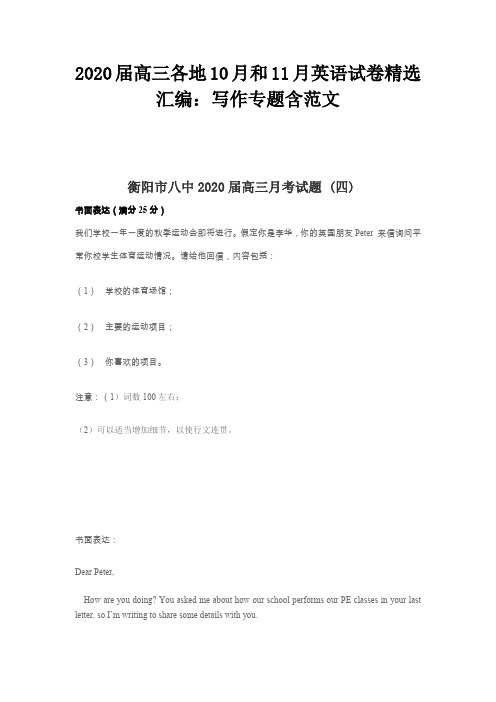
2020届高三各地10月和11月英语试卷精选汇编:写作专题含范文衡阳市八中2020届高三月考试题 (四)书面表达(满分25分)我们学校一年一度的秋季运动会即将进行。
假定你是李华,你的英国朋友Peter 来信询问平常你校学生体育运动情况。
请给他回信,内容包括:(1)学校的体育场馆;(2)主要的运动项目;(3)你喜欢的项目。
注意:(1)词数100左右;(2)可以适当增加细节,以使行文连贯。
书面表达:Dear Peter,How are you doing? You asked me about how our school performs our PE classes in your last letter, so I’m writing to share some details with you.Equipped with two playgrounds as well as a splendid stadium, our school offers us an opportunity to do a variety of sports. Not only do we take volleyball and basketball courses, but our school also holds all kinds of sports competitions. Among all sport s, I’m crazy about volleyball, which contributes to us cooperating with others.Yours,Li Hua武威六中2020届高三一轮复习过关考试(三)书面表达(满分25分)假定你是李华,你的美国笔友Jack给你发来邮件,告诉你他参加美国中西部“汉语桥”比赛(U. S. Midwest Chinese Bridge Speech Contest)获得了一等奖,希望你继续帮他学习中文。
安徽省六安第一中学2022-2023学年高三上学期第二次月考《英语》试题含答案

六安一中2023届高三年级第二次月考英语试卷时间:120分钟满分:150分第一部分:听力(共两节,满分30分)第一节(共5小题;每小题1.5分,满分7.5分)听下面5段对话。
每段对话后有一个小题,从题中所给的A、B、C 三个选项中选出最佳选项。
听完每段对话后,你都有10秒钟的时间来回答有关小题和阅读下一小题。
每段对话仅读一遍。
1.What is the probable relationship between the two speakers?A.Writer and reader. B.Doctor and patient. C.Teacher and student. 2.How does the woman feel about the news?A.Doubtful. B.Excited. C.Worried.3.Where does the conversation probably take place?A.In a book store. B.In a post office. C.In a classroom. 4.What are the speakers talking about?A.A new store. B.Italian dishes. C.Their supper.5.To whom is the woman speaking?A.A repairman. B.A manager. C.A salesman.第二节(共15小题,每小题1.5分,满分22.5分)听下面5段对话或独白。
每段对话或独白后有几个小题,从题中所给的A、B、C 三个选项中选出最佳选项。
听每段对话或独白前,你将有时间阅读各个小题,每小题5秒钟;听完后,各小题将给出5秒钟的作答时间。
每段对话或独白读两遍。
听第6段材料,回答第6、7题。
6.Why does the boy love Sundays?A.He has no homework.B.He can play basketball.C.He can watch sports on TV.7.What is the boy expected to do?A.Help with housework. B.Have a good rest. C.Go to school.听第7段材料,回答第8至10题。
高三英语月考试卷1
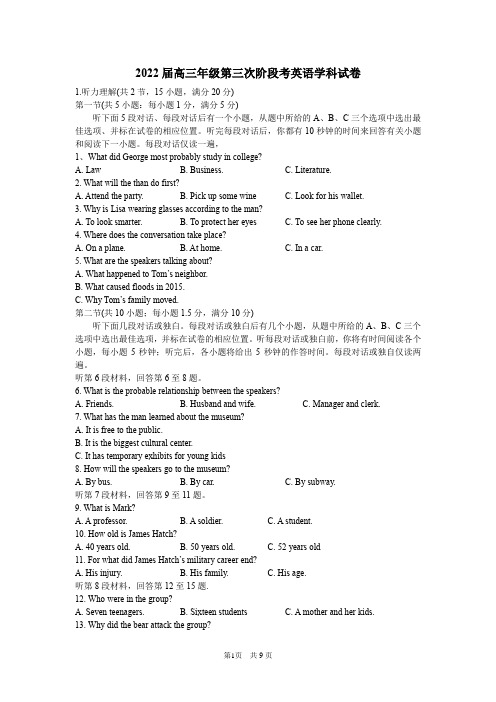
2022届高三年级第三次阶段考英语学科试卷1.听力理解(共2节,15小题,满分20分)第一节(共5小题:每小题1分,满分5分)听下面5段对话、每段对话后有一个小题,从题中所给的A、B、C三个选项中选出最佳选项、并标在试卷的相应位置。
听完每段对话后,你都有10秒钟的时间来回答有关小题和阅读下一小题。
每段对话仅读一遍,1、What did George most probably study in college?A. LawB. Business.C. Literature.2. What will the than do first?A. Attend the party.B. Pick up some wineC. Look for his wallet.3. Why is Lisa wearing glasses according to the man?A. To look smarter.B. To protect her eyesC. To see her phone clearly.4. Where does the conversation take place?A. On a plane.B. At home.C. In a car.5. What are the speakers talking about?A. What happened to Tom’s neighbor.B. What caused floods in 2015.C. Why Tom’s family moved.第二节(共10小题;每小题1.5分,满分10分)听下面几段对话或独白。
每段对话或独白后有几个小题,从题中所给的A、B、C三个选项中选出最佳选项,并标在试卷的相应位置。
听每段对话或独白前,你将有时间阅读各个小题,每小题5秒钟;听完后,各小题将给出5秒钟的作答时间。
每段对话或独自仅读两遍。
听第6段材料,回答第6至8题。
天津市天津市第一中学2022届高三英语上学期第二次月考试题(含解析)
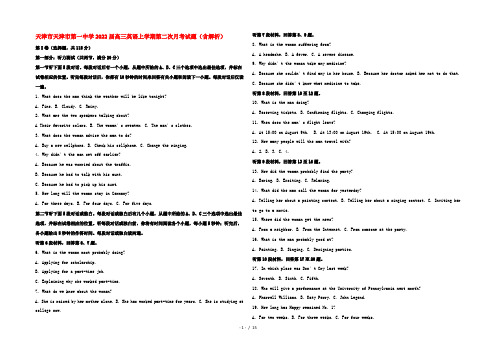
第I卷(选择题,共115分)
第一部分:听力测试(共两节,满分20分)
第一节听下面5段对话。每段对话后有一个小题,从题中所给的A、B、C三个选项中选出最佳选项,并标在试卷相应的位置。听完每段对话后,你都有10秒钟的时间来回答有关小题和阅读下一小题。每段对话后仅读一遍。
【答案】B
【解析】
【详解】考查动词辨析。句意:春节期间,由于安全和噪音污染,我国大部分城市都取消了烟花表演。A. defended辩护;B. cancelled取消;C. burst爆炸;D. broadened拓展。根据句意可知选B。
5பைடு நூலகம்—I ________ so busily recently that I ________ no time to help you with your maths.
A. 2. B. 3. C. 4.
听第9段材料,回答第13至16题。
13. How did the woman probably find the party?
A. Boring. B. Exciting. C. Relaxing.
14. What did the man call the woman for yesterday?
8. What is the woman suffering from?
A. A headache. B. A fever. C. A severe disease.
9. Why didn’t the woman take any medicine?
A. Because she couldn’t find any in her house. B. Because her doctor asked her not to do that.
湖南省师大附中高三英语第二次月考
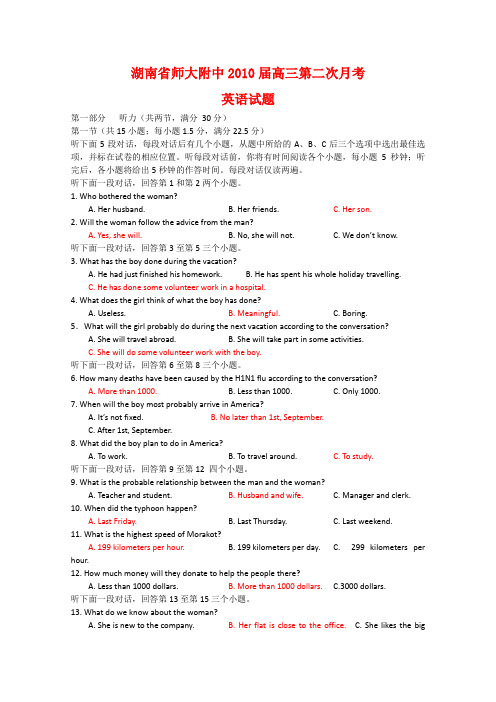
湖南省师大附中2010届高三第二次月考英语试题第一部分听力(共两节,满分30分)第一节(共15小题;每小题1.5分,满分22.5分)听下面5段对话,每段对话后有几个小题,从题中所给的A、B、C后三个选项中选出最佳选项,并标在试卷的相应位置。
听每段对话前,你将有时间阅读各个小题,每小题5秒钟;听完后,各小题将给出5秒钟的作答时间。
每段对话仅读两遍。
听下面一段对话,回答第1和第2两个小题。
1. Who bothered the woman?A. Her husband.B. Her friends.C. Her son.2. Will the woman follow the advice from the man?A. Yes, she will.B. No, she will not.C. W e don’t know.听下面一段对话,回答第3至第5三个小题。
3. What has the boy done during the vacation?A. He had just finished his homework.B. He has spent his whole holiday travelling.C. He has done some volunteer work in a hospital.4. What does the girl think of what the boy has done?A. Useless.B. Meaningful.C. Boring.5.What will the girl probably do during the next vacation according to the conversation?A. She will travel abroad.B. She will take part in some activities.C. She will do some volunteer work with the boy.听下面一段对话,回答第6至第8三个小题。
湖南省长沙市长郡中学2019届高三上学期第二次月考英语答案

&))#解析考查名词%文意为#当我给孩子们机会!562357"问我几个问题时$%选 #% &*)#解析考查副词%他们多半地!,8*1./"都想知道怎样才可以帮助我%选 #% &$)%解析考查名词%根据上文&可知之前一直是作者在照顾孩子们&因此小玛丽说*#现在轮到我们来照
大的积极的额外奖励!?83>*"%选 %% (#)+3*-+:21+83(!)'+073(%)+3(&)+1(')624?7732558,-23+74<7:72558,-23+74(()*5+**8:* ())Q621(*)185:7217($),/*17:+8>*)")>31+.
选 %% '))$解析考查名词%因 为 我 开 始 心 存 疑 虑&是 担 心 学 生 们 不 喜 欢 现 在 这 样 的 我%但 是 看 到 粉 红 丝 带 之
后&我松了一口气%P7.+79此处意思为安慰&轻松%选 $% '*)$解析考查动词%#小玛丽是第一个在队伍中向我打招呼!@:771"的孩子%$选 $% '$)"解析考查名词%#我帮助孩子们的时候&从未想过要任何回报%$+3:71>:3&作为回报%选 "% (")%解析考查名词%因为我从未奢望过任何回报&所以&当我收到来自孩子们的回报时&那对我是一种巨
2020届天津市耀华中学高三上学期第二次月考英语试题及答案

绝密★启用前天津市耀华中学2020届高三年级上学期第二次月考英语试题★请同学们将试题答案填涂或填写在答题卡上本试卷分第I 卷(选择题) ,第II 卷(非选择题) 和第III 卷(听力试卷)三部分, 共150 分, 第I,II 卷考试时间100 分钟,听力考试时间为20 分钟。
答卷前, 请务必将自己的姓名、考号、座位号填写在答题卡上和密封线外相应位置。
答卷时, 务必将答案涂写在答题卡上, 答在试卷上的无效。
考试结束后, 将答题卡和答题纸一并收回。
祝各位同学考试顺利!第Ⅰ卷(95 分)第一部分:英语知识运用(共两节,满分45 分)第一节:单项填空(共15 小题;每小题1 分,满分15 分)从A、B、C、D 四个选项中,选出可以填入空白处的最佳选项。
1. ---The Youth League Committee is looking for volunteers for the promotion ofrubbish-sorting. Would you like to join in?--- . Everyone should do his bit.A. You asked for itB. You betC. You have my wordD. You’ve got me there2. You can apply for a foreign university on the Internet by yourself, or you can turn to aspecial agency which can do it for you.A. appropriatelyB. alternativelyC. additionallyD. apparently3. is obviously right is to give all children equal opportunities to develop their specialgift.A. WhichB. AsC. ThatD. What4.Safety should be a priority in any industry and it should come as no surprise thatsafety issues early can actually save money, long-term, for companies.A. requiringB. inquiringC. addressingD. acquiring5. The school isn’t I really wanted to go to, but I suppose I’ll just have to it.A. the one, make the best ofB. the one, get away fromC. one, take advantage ofD. that, catch up with6. While it wasn’t the goal of the trip, I was rewarded with fresh insights, ones that tome during the regular course of business.A. might never happenB. could never have happenedC. should not happenD. needn’t have happened7. The better you have of words, the better chance you have of saying exactly what you mean.A. contributionB. benefitC. commandD. ability8. Nowadays, there still exist a lot of challenges facing some developing countries,thegreatest is hunger.A. thatB. of whichC. whoseD. to which9. ---How do you go to your office every day?---Normally, I take the subway to work,most of my colleagues.A. so doB. so doesC. as doesD. as do10. Using a new app named Papa, the elderly people can young volunteers to take care ofthem whenever they are in need.A. bring upB. come acrossC. call onD. pick up。
湖南省师大附中2019届高三上学期第二次月考英语试卷
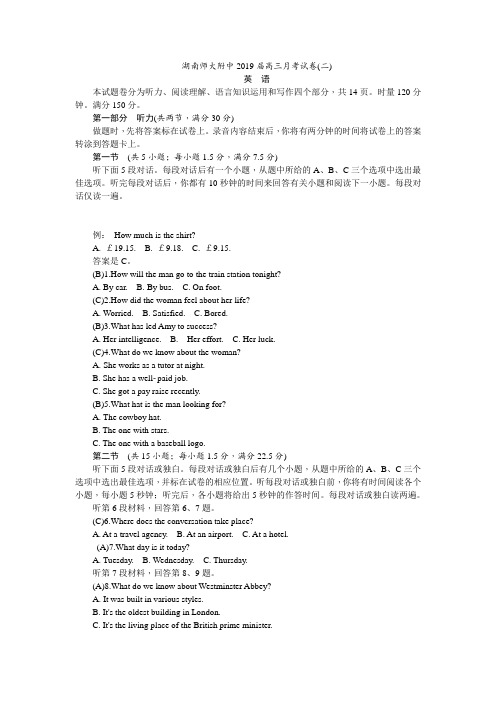
湖南师大附中2019届高三月考试卷(二)英语本试题卷分为听力、阅读理解、语言知识运用和写作四个部分,共14页。
时量120分钟。
满分150分。
第一部分听力(共两节,满分30分)做题时,先将答案标在试卷上。
录音内容结束后,你将有两分钟的时间将试卷上的答案转涂到答题卡上。
第一节(共5小题;每小题1.5分,满分7.5分)听下面5段对话。
每段对话后有一个小题,从题中所给的A、B、C三个选项中选出最佳选项。
听完每段对话后,你都有10秒钟的时间来回答有关小题和阅读下一小题。
每段对话仅读一遍。
例:How much is the shirt?A. £19.15.B. £9.18.C. £9.15.答案是C。
(B)1.How will the man go to the train station tonight?A. By car.B. By bus.C. On foot.(C)2.How did the woman feel about her life?A. Worried.B. Satisfied.C. Bored.(B)3.What has led Amy to success?A. Her intelligence.B. Her effort.C. Her luck.(C)4.What do we know about the woman?A. She works as a tutor at night.B. She has a wellpaid job.C. She got a pay raise recently.(B)5.What hat is the man looking for?A. The cowboy hat.B. The one with stars.C. The one with a baseball logo.第二节(共15小题;每小题1.5分,满分22.5分)听下面5段对话或独白。
- 1、下载文档前请自行甄别文档内容的完整性,平台不提供额外的编辑、内容补充、找答案等附加服务。
- 2、"仅部分预览"的文档,不可在线预览部分如存在完整性等问题,可反馈申请退款(可完整预览的文档不适用该条件!)。
- 3、如文档侵犯您的权益,请联系客服反馈,我们会尽快为您处理(人工客服工作时间:9:00-18:30)。
山东省曲阜夫子学校2019届高三英语上学期第二次(11月)月考试题第I卷第一部分:听力(共两节,满分30分)第一节(共5小题;每小题1.5分,满分7.5分)听下面5段对话。
每段对话后有一个小题,从题中所给的A、B、C三个选项中选出最佳选项,并标在试卷的相应位置。
听完每段对话后,你都有10秒钟的时间来回答有关小题和阅读下一小题。
每段对话仅读一遍。
1.How does the woman feel?A.Excited.B.Calm. C.Scared.2.Why was Jane late?A.She had an exam. B.She talked to a teacher. C.She stayed up last night.3.Who makes the best-looking dumplings?A.Bobby. B.Kristen. C.Sarah.4.Where does the conversation most probably take place?A.At an airport. B.In a hotel. C.At a bus stop.5.What will the woman do next?A.Buy the shoes at $150. B.Pay at the full price. C.Go to another store. 第二节(共15小题;每小题1.5分,满分22. 5分)听下面5段对话或独白。
每段对话或独白后有几个小题,从题中所给的A、B、C三个选项中选出最佳选项,并标在试卷的相应位置。
听每段对话或独白前,你将有时间阅读各个小题,每小题5秒钟;听完后,各小题给出5秒钟的作答时间。
每段对话读两遍。
听第6段材料,回答第6、7题。
6.How long has the woman worked in the present company?A.3 years. B.4 years. C.7 years.7.Why does the woman want to leave?A.She wants to make a change.B.She can’t get along well with others.C.She is dissatisfied with the present wages.听第7段材料,回答第8至10题。
8.Why will some children not go to school according to the man ?A.They drop out of school.B.They are taught by their parents.C.They go to city libraries.9.How old was the boy mentioned?A.6. B.16. C.19.10.What might be the problem with home schooling?A.It’s hard to get teaching materials.B.Parents usually don’t have enough time.C.Kids might lack social skills.听第8段材料,回答第11至13题。
11.What caused Ryan’s injury?A.Doing warming-up exercises. B.Playing soccer. C.Coaching players. 12.When will Ryan leave hospital?A.This Friday. B.This Saturday. C.Next Monday.13.What present will they give to Ryan?A.A bunch of flowers. B.Chocolate and bread. C.A pair of shoes.听第9段材料,回答第14至16题。
14.What is the woman speaker?A.A computer programmer.B.A computer major in college.C.A high school student of Senior 3.15.What does the man plan to do?A.Change his current career. B.Teach his daughter computer. C.Enjoy his vacation.16.What is the woman’s attitude towards her father’s plan?A.Positive. B.Negative. C.Sympathetic.听第10段材料,回答第17至20题.17.What is the talk mainly about?A.Forecasts of cold weather.B.Suggestions on keeping healthy.C.Reports on body injuries.18.When do we suffer from slow breathing?A.We can’t control our shaking.B.Our nose and ears get badly hurt.C.Our body can’t produce enough heat.19.What does the letter “ L” stand for?A.Loose.B.Layers. C.Light weight.20.Which one is preferred to do in cold weather?A.Wear a hat and scarf.B.Drink some alcohol. C.Do more sports.第二部分阅读理解 (共两节, 满分40分)第一节 (共15小题; 每小题2分, 满分30分)AChickenshed is an inclusive theatre company that first began in 1974. Primarily based at our own purpose-built department in North London, we create theatre for all ages and run successful outreach projects, education courses and membership programmes throughout the year. We are also a registered charity and rely heavily on the generous support of individuals, companies, trusts and funds in order to continue our pioneering work.Performance: Entertaining and inspiringWe regularly present original and entertaining productions for young children, families and adults that showcase talent. We also create new work, inspired by the people around us, about personal and social issues that affect society today which we then take on tour to theaters, community centers and schools across the UK. To date we've toured to over 200 schools, reaching 25,000 young people and rising.Visit our What's On section to find out more.Education: Everyone has a rightChickenshed changes lives by bringing young people from all social and economic backgrounds, races and abilities together to study creatively alongside each other, many of whom have been ignored by society and excluded from mainstream educational settings. Chickenshed has established a network of partners that enables us to effectively target children and youngpeople who would otherwise not be able to access our work. We also run Shedlink - an ongoing project that enables us to help community groups set up independent 'Sheds' around the UK.Membership: Celebrating diversityOur work uses the stage to celebrate diversity and performance as a vehicle to solve topical social issues. We hold weekly workshops where young people can gain a new-found confidence and get the chance to perform in major in-house productions. Visit the Membership section for more information.21. We can learn from the text that Chickenshed is ___________.A. a theater with a history of over 50 yearsB. a company located right at South LondonC. a charity relying on support from the publicD. a programme only intended for teenagers22. What can we infer from the text?A. Chickenshed welcomes individuals from different backgrounds.B. All members should create original works to show their talents.C. You can enjoy performances of Chickenshed in schools worldwide.D. Community groups have no right to set up their own programmes.23. Where is this text probably taken from?A. A fashion magazineB. An advertising posterC. An official websiteD. A theater reviewBIn an effort to prevent Cyber-bullying (网络欺凌), a 13 year-old girl has created a project that makes teens think twice about what they are posting, and rethink whether they actually want to send a potentially hurtful message.Trisha Prabhu’s “Rethink”project has already earned her a spot in Google’s 15 Global Science Fair finalists. The theory behind her creation is that a child’s brain tends to be less developed than an adult’s and therefore teens are more impulsive in what they write and don’t understand the possible consequences of their words.“Research shows that, over 50 percent of teenagers and teens have been bullied online and 10 to 20 percent experience it regularly. I supposed that if teenagers were provided analert mechanism (警示机制) that suggested them rethinking their decision if they expressed willingness to post a mean message on social media, the number of mean messages would be less than those who are not provided with such an aid”, the Illinois native said on her project site.The figures certainly show that her study is working, as she was able to prove that 93.4 percent of teens decided not to post a hurtful comment after they were given the option of reviewing the contents of what they had written.However, the 13 year-old is not content to rest on her achievements and is already planning her next project. She is looking to see how the ‘Rethink’system could work with various social media and apps to prevent cyber-bullying at source. “My design includes an advanced system that catches truly aggressive messages and works with social media sites on web or mobile platforms.”24. What does the underlined word “impulsive” probably mean in paragraph 2?A. Hot-headed.B. Clear-minded.C. Thoughtful.D. Considerate.25. How does the “Rethink”project work?A. It helps to fully develop children’s brains.B. It makes teenagers rethink before posting messages online.C. It protects teenagers who regularly experience cyber-bullying.D. It catches mean messages on social media and delete them.26. What can be learned about Prabhu from the text?A. She has won the competition at the Google Global Science Fair.B. She runs her project mainly by interviewing teens on social networks.C. Her project doesn’t work because teens still post hurtful messages.D. Her next plan is to prevent Cyber-bullying with an advanced system.27. What would be the best title of the text?A. How to Stop Cyber-bullying?B. Say No to Cyber-bullyingC. The “Rethink”Project Wins the AwardD. A 13-year-old’s Project to Prevent Cyber-bullyingCAlmost every day we come across situations in which we have to make decisions one way or another. Choice, we are given to believe, is a right. But for a good many people in the world, in rich and poor countries, choice is a luxury, something wonderful but hard to get, not a right. And for those who think they are exercising their right to make choices, the whole system is merely an illusion, a false idea created by companies and advertisers, hoping to sell their products.The endless choice gives birth to anxiety in people’s lives. Buying something as basic as a coffee pot is not exactly simple. Easy access to a wide range of everyday goods leads to a sense of powerlessness in many people, ending in the shopper giving up and walking away, or just buying an unsuitable item that is not really wanted. Recent studies in England have shown that many electrical goods bought in almost every family are not really needed. More difficult decision-making is then either avoided or trusted into the hands of the professionals, lifestyle instructors, or advisors.It is not just the availability of the goods that is the problem, but the speed with which new types of products come on the market. Advances in design and production help quicken the process. Products also need to have a short lifespan(生命周期) so that the public can be persuaded to replace them within a short time. The typical example is computers, which are almost out-of-date once they are bought. This indeed makes selection a problem. Gone are the days when one could just walk with ease into a shop and buy one thing; no choice, no anxiety.28. What does the author try to argue in Paragraph l?A. The practice of choice is difficult.B. The right of choice is given but at a price.C. Choice and right exist at the same time.D. The exercise of rights is a luxury.29. Why do more choices of goods give rise to anxiety?A. People are likely to find themselves overcome by business persuasion.B. Shoppers may find themselves lost in the broad range of items.C. Companies and advertisers are often misleading about the range of choice.D. Professionals find it hard to decide on a suitable product.30. By using computers as an example, the author wants to prove that___________.A. products of the latest design flood the marketB. competitions are fierce in high-tech industryC. everyday goods need to be replaced oftenD. advanced products meet the needs of people31. What is this passage mainly about?A. The opinions on people's right in different countries.B. The problems about the availability of everyday goods.C. The helplessness in purchasing decisions.D. The variety of choices in modern society.DWe all agree, surely – memorizing poetry is a good thing, and children ought to do it. But people do object. At least, they object to the idea that children should be forced to learn poetry. They tend to be people like Michael Rosen. Rosen has more practical objections to children having to learn poetry by the government’s order. Actually, Rosen is all for learning poetry, “when it feels right”, which is, he says, “one of those vague phrases much hated by people in authority and yet it is at the heart of good teaching”.He’s onto something about the timing, but that doesn’t mean policymakers are wrong to insist on pupils learning poetry. The problem is that some influential educationists have come to see learning by heart as a waste of time when tomorrow’s adults will want skills more than information.Let’s come to the most important objectors–children. Their objection tends to come in the least offensive form. It comes in the question: “Why are we doing this?”It’s a worthwhile inquiry. I teach at Sherborne School, where boys do learn poetry; and luckily there’s time in our lessons to answer that question.Here’s one of the answers I give. There’ll be one time when your good friend is going to introduce you to someone with whom he wants to spend the rest of his life. There’ll be a ceremony to honour this union, and words will be very important. You’re likely to be the one who has to stand up and say, “Let me not to the marriage of true minds/ Admit impediment…”And when you do that, you’re going to be speaking for everyone in the room. Now, everybodybreathes sigh of relief.Learning poetry and reciting poetry forces us to think of it in this public way. However mysterious and intimate poetry seems, we need to remember it’s something we also share, and offer each other. So take some, and pass it on.32. What does the underlined word “it” in the first paragraph refer to?A. The right timing.B. The poetry with vague phrases.C. The government’s order.D. The natural way to learn poetry.33. Which of the following would be favored by some influential educationists?A. To guide children how to recite poetry.B. To instruct children on how to get information.C. To teach students real life skills for the future.D. To force children to obey the government policy.34. As for the children’s question, the teacher should _______.A. consider it offensiveB. take it seriouslyC. dismiss it as worthlessD. discuss it after class35. What’s the writer’s attitude towards poetry learning?A. Objective.B. Supportive.C. CriticalD. Disapproving. 第二节 (共5小题; 每小题2分, 满分10 分)根据短文内容, 从短文后的选项中选出能填入空白处的最佳选项。
